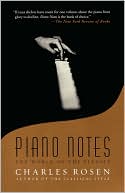Piano Notes: The World of the Pianist
Search in google:
Among the world's instruments, the piano stands out as the most versatile, powerful, and misunderstood -- even by those who have spent much of their lives learning to play. In Piano Notes, a finalist for a 2003 National Book Critics Circle Award, Charles Rosen, one of the world's most talented pianists, distills a lifetime of wisdom and lore into an unforgettable tour of the hidden world of piano playing. You'll read about how a note is produced, why a chord can move us, why the piano -- "hero and villain" of tonality -- has shaped the course of Western music, and why it is growing obsolete. Rosen explains what it means that Beethoven composed in his head whereas Mozart would never dream of doing so, why there are no fortissimos in the works of Ravel, and why a piano player's acrobatics have an important dramatic effect but nothing more. Ending on a contemplative note, Piano Notes offers an elegant argument that piano music "is not just sound or even significant sound" but a mechanical, physical, and fetishistic experience that faces new challenges in an era of recorded music. Rosen ponders whether piano playing will ever again be the same, and his insights astonish. The New Yorker In A Pianist's Landscape, Carol Montparker quotes Martha Argerich as saying, "I love to play the piano, but I hate being a pianist." Alone onstage and performing from memory, a piano soloist probably has the loneliest, most nerve-racking job in music. Boris Berman's Notes From the Pianist's Bench offers an illuminating program of technical tips culminating in advice on what he calls the "technique of the soul," a method of consciously learning a series of emotional responses that reliably situate the performer inside the spirit of a piece. Drawing on Stanislavsky's theories of acting, Berman explains that "during the emotional high of an inspired performance a pianist should never cease listening to an objective inner monitor that guided him through hours of preparatory work." One contemporary pianist famous for listening to his inner monitor is Alfred Brendel. In his recently published conversations with Martin Meyer, Me of All People, translated from the German by Richard Stokes, Brendel recalls the enviable confidence of his early career: "I went on stage, played and did not realize what fear was." The main challenge, he says, lies in balancing fidelity to the work itself with personality and spontaneity. When things go well, "one has the impression that the work is playing itself." And, according to Charles Rosen's Piano Notes, a good performance occurs not in spite of technical trials but sometimes even because of them: "There has to be a genuine love simply of the mechanics and difficulties of playing, a physical need for contact with the keyboard, a love and a need which may be connected with a love of music but are not by any means totally coincident with it." (Leo Carey)
PreludeixChapter 1Body and Mind1Chapter 2Listening to the Sound of the Piano33Chapter 3The Instrument and Its Discontents63Chapter 4Conservatories and Contests89Chapter 5Concerts117Chapter 6Recording143Chapter 7Styles and Manners175Postlude229Acknowledgments237Index239








